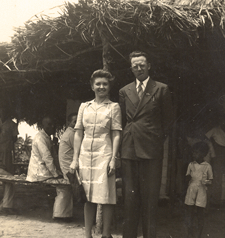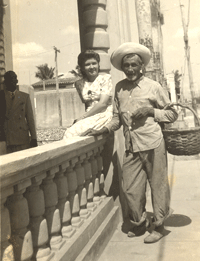 |
honeymooon in havana
by Susan Henderson
Read The Forgotten Days of Early Cuba which chronicles the foundation of early Free Will Baptist Missions work on the island of Cuba.
|
April 4, 1944—Aurora, Missouri
The wedding of Rev. Winford Davis and Miss Burnice Bradley, daughter of Mr. and Mrs. Ed Bradley took place at 9 o’clock last night. At midnight the bride and groom departed by
train for Nashville, Tennessee. They will leave Nashville by plane to Havana, Cuba.
(excerpts from Aurora Advertiser, 1944).
As a thirteen year-old mush-machine, my heart raced as I slowly thumbed through a time worn scrapbook in my grandma’s living room. A honeymoon in Havana—how romantic! I imagined my grandparents strolling hand-in-hand along the moonlit beach, relishing the balmy Cuban evening. I could see them examining native crafts and selecting souvenirs from a quaint open-air market. I gazed into my grandpa’s adoring eyes as a Cuban guitarist strummed love songs softly into the subtropical breeze. A month in paradise—what a way to start a relationship!
ADVENTURE OF A LIFETIME
As I continued to turn the yellowed, brittle pages, an entirely different scene unfolded. Black and white photos painted a full-color picture of poverty. Dirt roads, straw-roofed huts, and shabbily dressed children with bare feet brought my romantic vision to a screeching halt. I began to question my grandma, and the stories soon rolled with the wooden wheels on the mule-drawn wagons in the photos. Yes, my grandparents enjoyed a brief stay in beautiful Havana, but they quickly moved on to the newly established Free Will Baptist mission work in Pinar del Rio, welcomed by Mr. and Mrs. (Mom and Pop) Willey, two of the small handful of people in the area who spoke English.

On the morning after their arrival, a native “beautician” showed up at their honeymoon hut to work her magic on grandma’s beautiful, flowing auburn locks. As the rudimentary stylist tightly pinned up her long strands, Mrs. Willey explained to grandma that if she walked down the street with her hair on her shoulders, she would be solicited for prostitution!
My grandparents did take a walk together on their honeymoon, but their steps did not fall upon golden sand. Instead, they walked over a steep hill into a shadowy valley to say goodbye. The following morning my grandpa planned to leave for a mule-back trip into the jungle with Pop Willey. They would be gone for a week. The dark solitude of the valley matched Grandma’s spirit. “I’ve never felt so alone and so scared,” she recalled.

As she waved goodbye to the love of her life, my brave grandma readied herself for the week-long adventure of a lifetime. She was one of only three English speakers in the village. Thankfully, language barriers never stand in the way of getting to know children, and grandma soon found herself falling in love with scores of round-faced Cuban children.
The language difference did pose a problem, however, when a local egg salesman approached my grandma, as she cooled herself in the breeze on Mrs. Willey’s porch. He spoke in rapid-fire Spanish; she understood nothing. He gestured wildly toward his product. She shrugged helplessly. In the background the good folks at the mission enjoyed a hearty laugh at her expense. She wouldn’t tell me how many dozen eggs she ended up with!
As promised, seven days later grandpa’s faithful mule carried him back to the arms of the woman he loved. As they boarded the plane that would carry them home, Grandpa caught her hand, as well as her gaze, and whispered, “Burnice, let your hair down.” Be still, my heart!
The week in Pinar del Rio signified only the beginning of sad goodbyes and lonely times for grandma. As secretary/treasurer of the Free Will Baptist Foreign Missions Board, as well as a local pastor and evangelist, grandpa traveled frequently. He leaned on my grandma’s strength, faith, resolve and creativity. She multi-tasked long before Oprah coined the term. Grandma was a wife, receptionist, public relations specialist, travel agent, bookkeeper, accountant, and Chief Executive Officer of her home. She was mother and father to her three children in grandpa’s absence. I’d like to paint a “suffering saint” picture and tell you she did it all without complaining, but she didn’t. The truth is, she suffered bouts of depression, discouragement, even resentment. And like most women (at least in my family), she vocalized them. However, through all the dark and lonely valleys she never quit. She stood by her man, her God, and her family—even when she stood alone.
FREEDOM FIGHTER
As I listened to her reminisce, my heart swelled with pride. My grandma was quite a woman. I admired her strength, her devotion, her independent spirit; and I hoped that those same traits would work themselves into my own heart and soul. Romance is wonderful, but if faced with the choice I’d gladly take Grandma’s integrity and fortitude.
Looking back on that day in Grandma’s living room, I remember her gazing fondly—not at the photos of Havana, but at the adults and children of Pinar del Rio. Without needing to ask, I know she would live it all over again in a heartbeat, even the walk through the valley. The Cuban people were that important to her. Why the deep connection? At age 13, I could not understand it, but now I realize that among the Cubans, she found common ground, a common spirit.
In 1944, the people of Cuba found themselves strangled in the grip of a corrupt leader, Fulgencio Batista. Because he had close ties to organized crime and a reputation for violence, the people feared their leader. Opposing politician Fidel Castro waited in the wings. With sadness in her voice, Grandma explained that many of the sweet people in her pictures died during the clashes between the two evil men.
In 1959, Castro became Cuba’s communist dictator clamping down on personal freedom, including religion. Her people still cry for freedom. Grandma understands their cries. She, too, was a freedom fighter.
At age sixteen, sitting in the floor of a different room, thumbing through a different scrapbook I began to understand my grandma’s fighting spirit. As I held my mother’s baby book in my hands, I read a puzzling entry. Freda Sue Gold, born on February 11, 1937. Freda Sue Gold? How odd. Mom’s maiden name was Davis. When I questioned mom about what I thought was a misprint, she explained that Rev. Winford Davis was not her biological father; grandma had been married before. Her first husband, my natural grandfather, was a violent, abusive alcoholic. As I sat in stunned silence, I heard my mom call my grandma. Before long, she handed the phone to me. “I never told you because I was afraid you’d be disappointed. Are you?”
Many emotions swirled through my heart at that moment, but none could be called disappointment. Pride? Yes. Awe? Yes. Admiration? Definitely. At a time when society— especially the church—turned up its nose at divorced women, grandma found the courage to fight for her freedom and that of her small daughter. Several years later, she chose to lead her small, fractured family into better, safer days with a man who loved and cared for her and her child, the only father my mother ever knew.
As I write this article and revisit the photos in grandma’s weathered scrapbook, I understand that, in spite of the language barrier and difficult circumstances, perhaps Grandma understood the Cuban people better than Grandpa, better than the Willeys—maybe better than anyone. She knew what it was like to be oppressed and afraid, and she knew the courage it takes to stand and fight for something better. She carried that knowledge back to the United States and used it in her ministry with grandpa in churches, in communities, and in her own family.
HAPPILY EVER AFTER...
Most romantic tales end with the famous phrase, “and they lived happily ever after.” This love story has a different conclusion. My grandparents did not always live happily, and in May 1997, my grandma said a final, earthly goodbye to the man she loved. No, my grandparents didn’t live happily ever after, but I proudly proclaim that they lived. They loved, they laughed, they fought, they failed—they lived. I only hope I can live up to their example.
ABOUT THE WRITER: Susan Henderson is the secretary of Purdy Elementary School in Purdy, MO. She has written several books, including And a Little Child Shall Lead Them, a devotional book about children,
|

